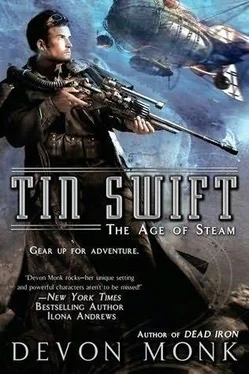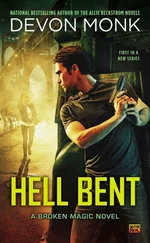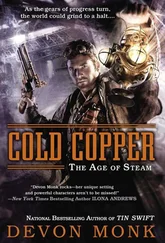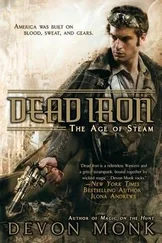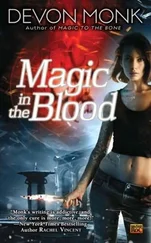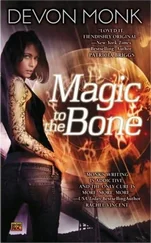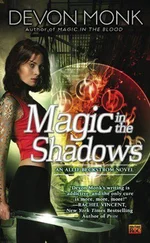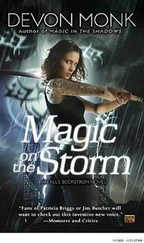He didn’t wait. He strode up to the back door of the house and tried the latch.
The door opened onto the kitchen. A woman lay on the floor. She was missing both of her arms. Silent. Dead.
In the far corner of the room huddled a child. He’d guess her to be maybe eight or ten years old. Still in her nightgown, bareheaded, barefoot, her cheek tipped onto her bent knees, her hands gently clasping her ankles.
She didn’t move. But a soft, wheezing cry drifted from the corner of the room. Cedar put his hand on the doorjamb. No song of the Strange came to him. He took a cautious step into the room.
“Child?” he said quietly.
The girl still didn’t stir. But the wheezy sob continued.
Cedar crossed the kitchen, carefully stepping around the mother, and knelt in front of the girl.
“There, now,” he said. “It’s going to be fine.” He placed his hand on her shoulder, hoping he wouldn’t startle her.
At his touch, the song of the Strange shot through him like greased lightning, cracking in his skull and stabbing straight through his feet to fuse him to the earth.
The Strange hadn’t just touched this girl, they had infested her.
He could feel a tremble, a ticking beneath his fingers.
The girl was not a girl. Or at least not anymore. Now she was a hollowed-out shell. A doll with clockwork innards that ticked, ticked, ticked, slowly winding down while leather bellows wheezed out the last of the air it had been pumping into her lungs.
The Strange had made her. Or remade her.
The girl fell sideways. A metal key stuck out of her back. A small key made of tin that ground to a stop like a music box striking the last tine.
“Mr. Hunt?” It was Rose, come into the room.
“Rose!” Cedar called. “Don’t!”
But it was too late. The key stopped moving. Touching the girl had sprung the Strange trap. He’d set off some kind of trigger set deep within her. A trigger that sparked a short fuse.
Cedar was on his feet, running, throwing himself to shield Rose. They tumbled out the door, but the explosion was immense. The kitchen, the mother, and the girl flew into bits. A barrage of flesh and bone and wood rained down around them where they lay out in the mud. His leather duster shielded him from the worst of it.
But Rose was not so lucky. The tin key arrowed into her left shoulder and burrowed in deep. She yelled, and her eyes went wide before they rolled back in her head.
“Rose?” Cedar lifted up off her. She was breathing, fast and shallow, but she did not come to. There was too much blood. Her blood.
He needed Mae. Needed to get that bit of metal out of her. Needed medicines and stitching and herbs.
Cedar swept Rose up into his arms, his heart drumming hard.
A sound behind him made him turn.
Even in the darkness, the mess of blood and flesh from the explosion was startling.
But not as startling as the dead mother who lay on the ground and shuddered. Something—no, not something; the Strange, ghostlike with too many eyes, too many mouths, too many arms—pulled up from the ground beneath her and slipped inside her like a man shrugs into an ill-fitted shirt.
The mother stopped shaking. Then she sat straight up, and got to her feet.
Her ruined face twisted in inhuman glee as she limped toward Cedar. “Hunter,” she exhaled.
Cedar had seen the Strange wear the dead once before. Didn’t know how they did it. Didn’t have time to question. But he knew they were damn hard to kill.
He shifted his hold on Miss Small and drew his gun. He unloaded three bullets straight into the mother’s heart.
And still she kept coming.
He couldn’t fight with Rose in his arms, and he was not about to put her down. So he strode to the center of the town.
“Madders!” he yelled as he jogged toward the fire. “We have a problem.”
As he rounded the last house before the clearing, he saw that the pile of dead bodies they’d so carefully stacked up was now much less carefully unstacking itself.
The dead were rising. Strange slinking down out of the hills and up into bodies to try them on for size.
Vicinity’s townfolk rose up with the look of murder in their eyes. And started toward him.
Captain Hink leaned out the port door, holding the dead man’s grip just inside the Swift. Here amid the clouds and freeze, the wind slapped across the tip of Beggar’s Peak and chuffed against the Swift, making her bob like a cork in a tub.
Not many ships were small enough or fast enough to hide here. It took some tight maneuvering to slip into this notch of rock and snow. But for the ship that could sling it, the tight wedge of stone just north, and the outcropping here, were enough to shelter from the worst of winter’s howl.
For a short time, at least.
He’d ordered them to throw anchor and bank the boiler. He wanted quiet and he wanted still. There wasn’t a wisp of steam to give them away, not a click of gear or pump of propeller.
Molly had seen to it that even Guffin was sitting still and keeping his mouth shut—no mean feat.
The Swift was as invisible as a frog’s eyelash.
Captain Hink pressed the brass telescope to the darkened lens of his goggles and closed his left eye to better see the edge of the rocks and cliffs around them. Stump Station was just east a ways. If there was a ship taking to the skies, if there was pursuit, it’d be coming from there.
The rocks were clear, no glimmer, no smoke, no shadow. Hink lowered the telescope and readjusted his breathing gear over his mouth, and his goggles, making sure the leather buckling both together was secure. The rubber hose that ran from his mouthpiece over his left shoulder and on off into the lines of the ship had plenty of slack, but not so much that it would tangle him up.
They weren’t up high enough for the air to kill a man quickly, but blacking out or tripping over a line and taking a tumble from the running board of the ship wasn’t going to keep a man’s tranklements in one piece either.
A glint off starboard caught his eye. He swung the telescope in that direction, and worked to keep the eyepiece steady in the roiling winds.
The Black Sledge , a big steamer, dark-skinned and peaked at the top, bulgy with exterior belly lifts and eight sets of blades driving her on, lumbered up along the ragged edge of the mountain. She was a fully enclosed gondola like the Swift and didn’t have the ocean-faring open-desk style of vessel dangling beneath her envelope.
She wasn’t shooting the glim, didn’t even have her nose pointed up, or her trawling arms and nets at the ready. No, she was low and slow. Looking for something. Looking for them.
Hink swung into the Swift and shut the door, then spun the latch to keep her tight. He one-fingered the buckle on his breathing gear and let it hang at his chest.
Molly stood at the helm, breathing gear unsecured at her neck. Guffin leaned near the vertical and horizontal rudder controls, scowling like he’d gotten his knuckles rapped by the teacher. He was a slow-eyed and sad-looking fellow with dark brows set too wide and light hair shaved up high off the back of his neck, but left to grow at the top so that his whole head took on a sort of sorry mushroom look.
Mr. Seldom was back among the glim gear, using his pocketknife to clean up a net spread at his feet.
The other member of the crew, Mr. Lum Ansell, a squat, short-necked man of unknown heritage, was sleeping up against the starboard wall, his hat pulled over his round leather brown face, the brim stopped by the breathing gear latched across his chin. Out of all of them, Lum never seemed to find much use for the breathing gear, no matter how high they flew.
Читать дальше
